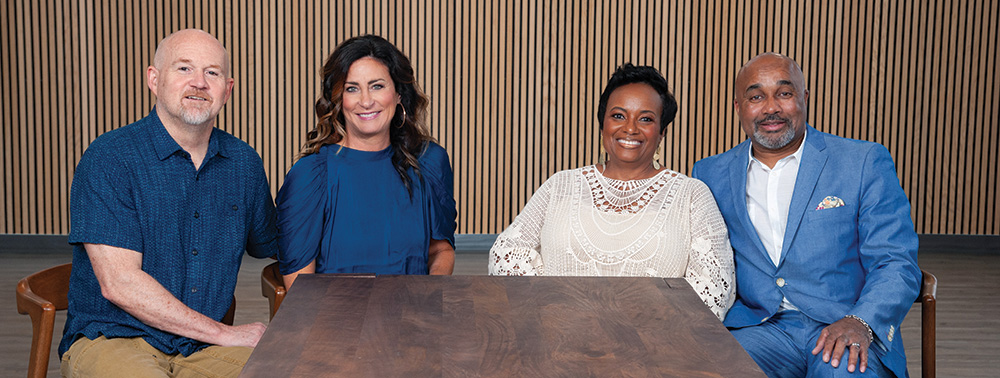
Robert and Susan Green, Bridgett and Johnny Clayton
MCL Editor Katie Eubanks Ginn recently sat down with two couples — Robert and Susan Green, and Bridgett and Johnny Clayton — to hear their stories and what God has taught them about marriage. Robert and Susan are pastor and children’s minister respectively at Fondren Church in Jackson and have been married 27 years. Bridgett is an attorney, and Johnny is a senior respiratory therapist at Merit Health — they have been married 40 years. This interview has been edited for space, but you can hear it in full on the MCL podcast, “A Closer Walk.” Just go to Apple Podcasts or Spotify and search for “Mississippi Christian Living”!
Katie Eubanks Ginn: I would love to hear how each of y’all met.
Johnny Clayton: We met our junior year of high school. We started dating our senior year. We started as great friends.
Bridgett Clayton: He attended some of my classes. I went to the city schools, and he went to the county schools.
Robert Green: I went to Mississippi State, Susan went to San Diego State, but we met one summer at Colorado State. I was finishing up with seminary with Campus Crusade for Christ — it’s called Cru now — (at their) International School of Theology. So I was finishing up, and Susan was (going through staff training) with Campus Crusade.
I was able to carry her books to class for her. I flirted with her. I poured it on pretty thick.
Susan Green: It worked, obviously.
I felt a call after college to full-time ministry, specifically college ministry. He’d already been in college ministry. … It was a bringing together of a like-minded, we would say, calling. So even though I’m from California and he’s from Mississippi, a lot of differences there … Our faith is what grounded us.
RG: We always tell people, don’t let long distance be the thing (that keeps you apart). We made it happen coast to coast. I was the campus director at the University of Miami at Coral Gables … We kept in touch before cell phones (were prevalent). We wrote letters.
BC: We dated throughout college at Meridian Community College. We took lots of courses together. I even did his homework sometimes. (laughter all around)
JC: I allowed her to. To get closer. Always an angle to get closer. (more laughter)
BC: He proposed before I transferred to The University of Mississippi (after two years). We did letters as well. I was home every other weekend, and he’d come up and see me on the weekends I didn’t come home.
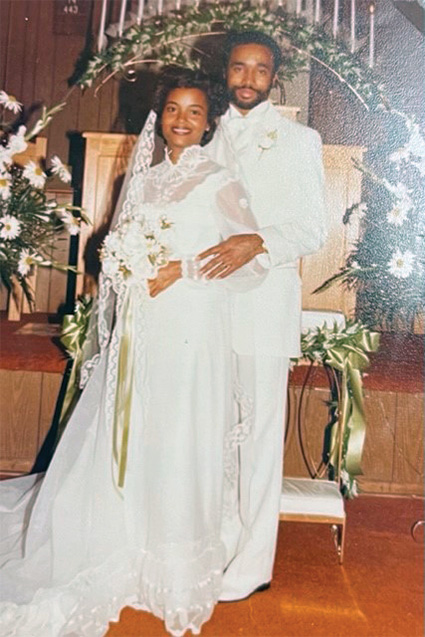
Johnny and Bridgett on their wedding day
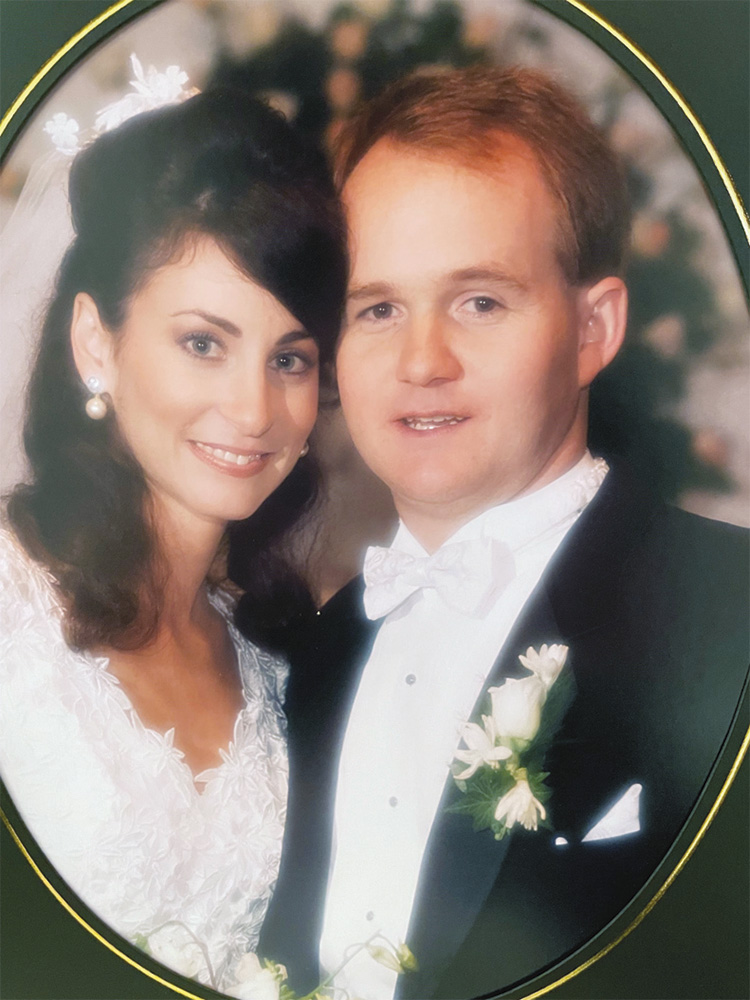
Susan and Robert on their wedding day
KG: What were you most unprepared for as newlyweds?
JC: Probably for us it was finances, because we left home, (where) our parents were taking care of everything, and you dive into this apartment and all the bills are coming, and you’ve got to juggle things, figure out what kind of insurance (to get) …
BC: I can think of one, too. Since his shift was 7 to 3 at the hospital, and I worked 8 to 5 … he would be playing basketball when I would get home … He played basketball a lot prior to marriage, so that was something he enjoyed doing.
JC: After a while, I realized, she probably wants me to be home some when she gets there. Not every evening playing ball.
KG: What was the biggest thing that helped y’all start handling money well?
JC: She brought a lot of stability to me. She brought the budget.
BC: He would tease me for having a structured menu for the week. (laughs)
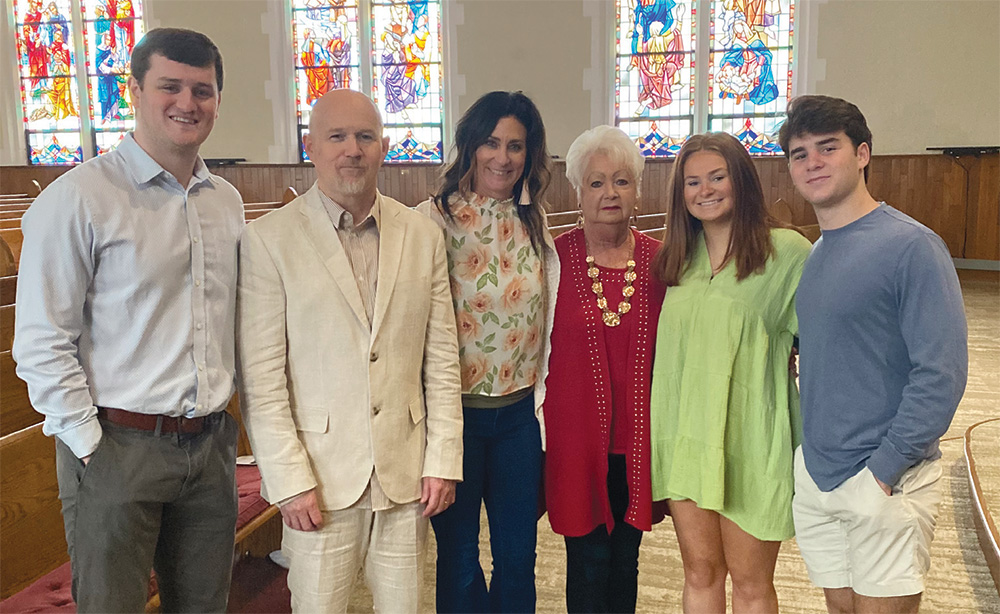
From left: RJ, Robert, Susan, Robert’s mom Glenda Yarber, Hayley, Wesley
KG: Greens, what about y’all? Any early challenges in marriage?
RG: Strangely, we had a pretty good first year. Some of our biggest challenges came after kids.
The pros tell us that in marriage, you fight over five things … Money, sex, communication, kids and in-laws. And I tell young couples here that we do pre-marriage counseling with that Susan and I are 5 for 5. We’ve fought about all of them. If we had to isolate a fight or two early, it would be money.
SG: When we first got married, we were still in the get-to-know-you discovery stage. … All the newness was fun and a good thing at the beginning. Then when you settle in …
RG: It’s common for me to marry a young couple, and a few months later I’ll connect with the guy. (And) I go in and fill in the blanks: ‘It’s different right?’ Yeah, she’s different. (He’s) finding what we found … that you married someone very different than you.
The enemy wants to take our differences and say uh-oh, maybe you made a mistake … and God wants to take our differences and say, ‘Hey, this is part of My design … Let those differences be the things that bring you together.’
JC: If both of you (were) the same, it wouldn’t work.
BC: We facilitated premarital counseling at our church for five or six years, and then we facilitated the couples’ ministry with children for about seven years, and that’s what we talked about was, how do we go around those things that look like molehills, but they can turn into mountains?
I do a lot of family law, so I see a lot of things … When people are having problems that have been married for a while, one of the common denominators is that they don’t worship together.
RG: Susan and I have gotten more emphatic with couples whom we interact with here to think about three spaces: the marriage bed, the dining room table, and the church pew.
If you’re having meals together, you’re solving a lot of things. And that changes when kids come. You almost have to be like a drill sergeant to get everyone in the room together.
And a pastor’s kind of paid to say this, but for us it’s really a passion: If you don’t worship together, there’ll be a slow drift.
I don’t know what it’s like to get a family to church …. But thank God for Susan here. She’s done that for years without me. I know it’s a battle to get kids to church. It’s harder to get to church than other places, and we should probably ask why.
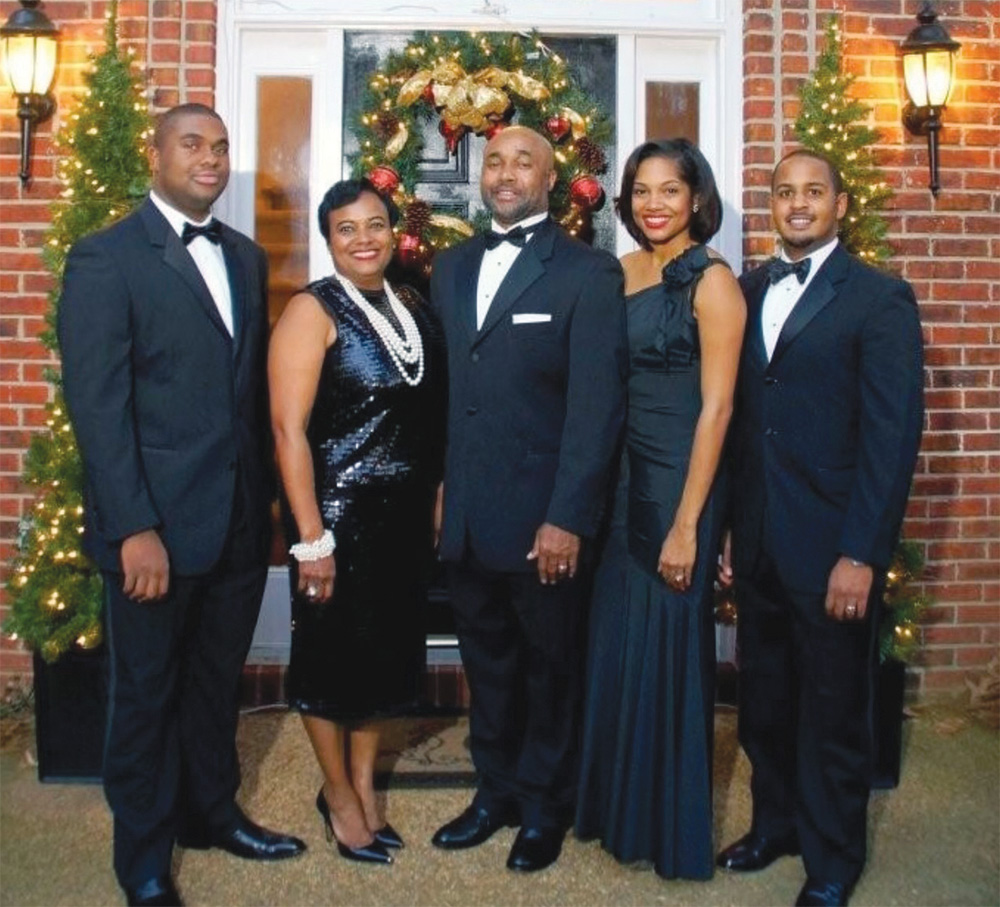
From left: Joshua, Bridgett, Johnny, Jabrina Clayton Edwards and Marcus Edwards
KG: What are your biggest personality differences?
BC: I am an attorney, (and) I’m very talkative. Which helps me (at work). Sometimes at church in our groups, (Johnny) has to nudge me, ‘Let someone else talk …’ He’s not shy but just more reserved … He has grown so much in public speaking. Of course the training that he’s received as a deacon at our church, New Hope, has developed him spiritually.
He’s always been a really, really good, humble guy. (But) I could be provoked and say things. He has helped me … to think about what I say, particularly in situations that could be confrontational, to pray about things before I answer.
They have a rotating schedule where the deacons at our church pray before the congregation, and it’s just been a tremendous blessing to me to sit in the congregation and watch him do (that).
RG: One of our early differences (was that Susan’s father) could fix things around the house. I can’t fix anything around the house. … She was patient with me, but I think I hurt her or frustrated her, because I’d wait on a neighbor to come fix something, or I’d let something that broke just stay broke.
SG: It also challenged me. Maybe I can do this. So I learned how to do some things .… I appreciate all (his) other strengths.
We are everything, on a personality test, opposites. … He wears everything he’s feeling on his sleeve, (whereas) I stuff it in. He’s a risk-taker. He’s always thinking about the next mountain to climb. (In marriage) you see yourself as you really are. I know things I need to grow in … It’s not my job to change him, to make him more like me. His strengths are what I need. I just didn’t know it.
RG: I wanted to plant Fondren Church like a year before (we did), but she wasn’t ready. It was good for her to express that and for me to wait on her. The prophet Amos says, can two people walk together unless they agree?
KG: Robert, you mentioned that some of your difficulties came after y’all had kids. I’d love to hear from each of you how parenting challenged y’all.
RG: Marriage changes you, but parenting really changes you. Marriage showed us a bit of our selfishness, but parenting showed us more. ‘You take the baby.’ ‘No, you take the baby.’
SG: And there are things you’re bringing in from your family of origin that you weren’t even really aware of.
JC: Your focus changes. You have to shift gears and really focus on the child, or children … because they can’t do it. God entrusted you with their life.
SG: (But) you cannot revolve your family (around your kids) — it’s a hard balance, because they suck so much of you, and they require so much — but do not lose your relationship (with your spouse), because when (the kids) are gone, we see a lot of marriages fail.
JC: You have to keep doing the things (that draw you closer as a couple), so the kids can see date night (for instance).
RG: I’ve joked before, our kids are going to be grown and gone one day and be struggling with something, and they’re going to say, ‘Wait, the problem is I don’t have a small group.’ For many years, on Sunday night, a group of couples would come over to our house … and (our kids) saw that. It’s a good thing for them to see, ‘Mom and Dad just aren’t there for us.’
If you’re not careful, you’re going to wake up and your kids are going to have great hair and be good at soccer, but they don’t know Jesus, and they may not respect you, if you’ve idolized them.
BC: Rearing children who are structured means letting them know things are required of them. That’s what we instilled in ours. … They were not perfect children … but they didn’t fuss about attending church too much. They knew that was part of the structure … And they knew school assignments and chores were required before they were able to do other things. Now they’ve acclimated to the professional field.
I was the disciplinarian. I could have conflict (with the kids), running my mouth, being argumentative and debating, but (Johnny) would just look at them and say, ‘Let’s talk.’ And it’s resolved. (laughs)
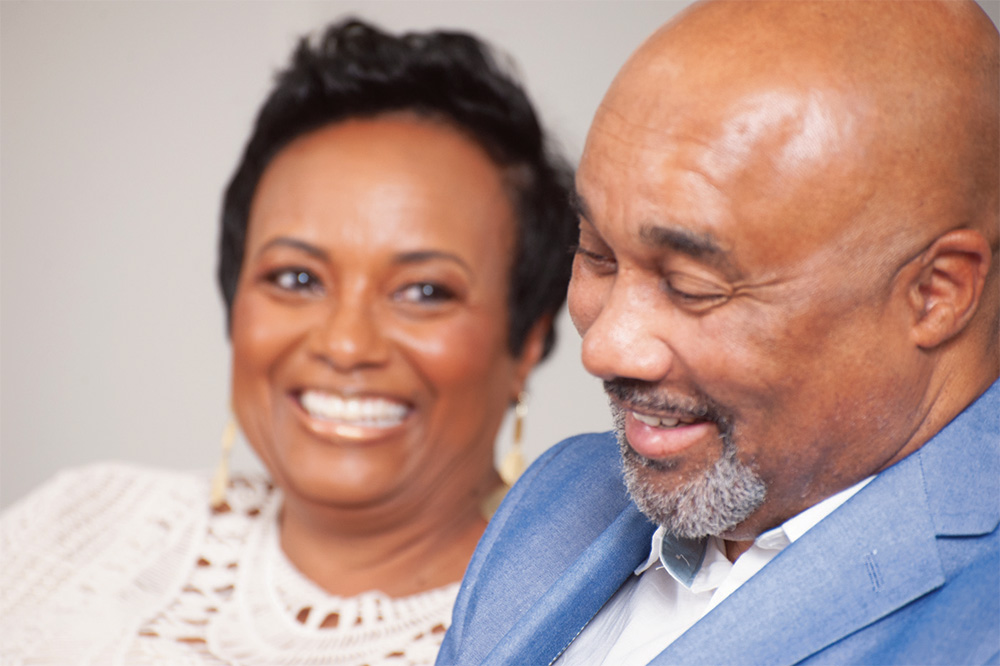
KG: How do you keep your relationship with God at the center of your marriage?
BC: Our church gifted us a subscription to Right Now Media (which) covers a wide array of religious topics. I just finished a 10-day fast through Right Now Media, and the study talked about the different reasons for fasting.
JC: I’m an early person. I get up at 4:30 or 5:30, pray, and then exercise.
RG: We’ve never harbored any illusions of quiet time together, because we’re so different. But we see each other. We can tell when the other (person) is not taking time (with God). Noticing if you have your Bible and that book you’re reading next to the bed. Making sure it’s not just a Sunday-to-Sunday experience.
My times are up here in my office (at the church). On Saturday night, if we’re not on a date, she’ll touch base with me (as I’m preparing to preach the next morning). She’ll bring something up here or come give me a hug.
SG: Being in full-time ministry is always a shared thing that we have together.
RG: In ‘Wild at Heart,’ John Eldredge says (what a woman) really wants is for you to pull her to your side and point the way and say, here’s where we’re going. I think one thing that gives (Susan and me) an advantage is that every day we realize we have a mission. I preached that recently, that every marriage needs a mission. A mission can glue you together.
JC: We use the word ‘intentional’ a lot.
BC: There are a couple of books that we recommend: ‘His Needs, Her Needs,’ and ‘The Five Love Languages’ by Gary Chapman.
You should love your spouse every year more. You need to have some “bae-cations,” as we call them. December 18 is our anniversary. We take a week just for us. You just need that time.
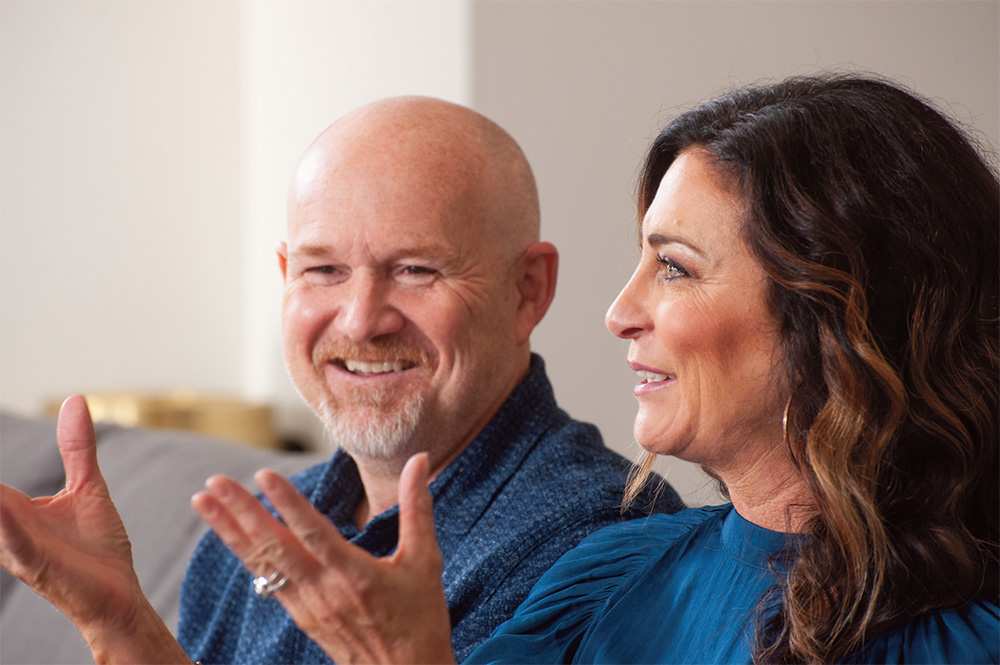
KG: I’ll close with a fun one — tell me your favorite thing about your spouse.
SG: Mine’s easy: His sense of humor. He makes me laugh, still. And along with that, his joy. He’s a joy giver. … That can be good for someone like me, who can be really serious sometimes.
BC: I can love my husband more every day for being as humble as he is. He is always the anchor bringing calmness in the storm. He’s steadfast in his faith. He knows the Lord. He sees the bright side of everything. You need someone to make you feel secure.
JC: OK, that’s it, the women have spoken. That’s all we need to know! (laughter all around)
What I admire about my wife is discipline. She’s very disciplined. When we first met, that’s what really attracted me to her. She helped me learn how to calm down and really be still and seek the Lord and where He’s leading me.
RG: What drew me to (Susan) was her beauty … but her humility, that keeps me. She grew up in a real swanky neighborhood in California, and they had a lot, but she doesn’t care about that stuff. … She’s happy living in Mississippi.